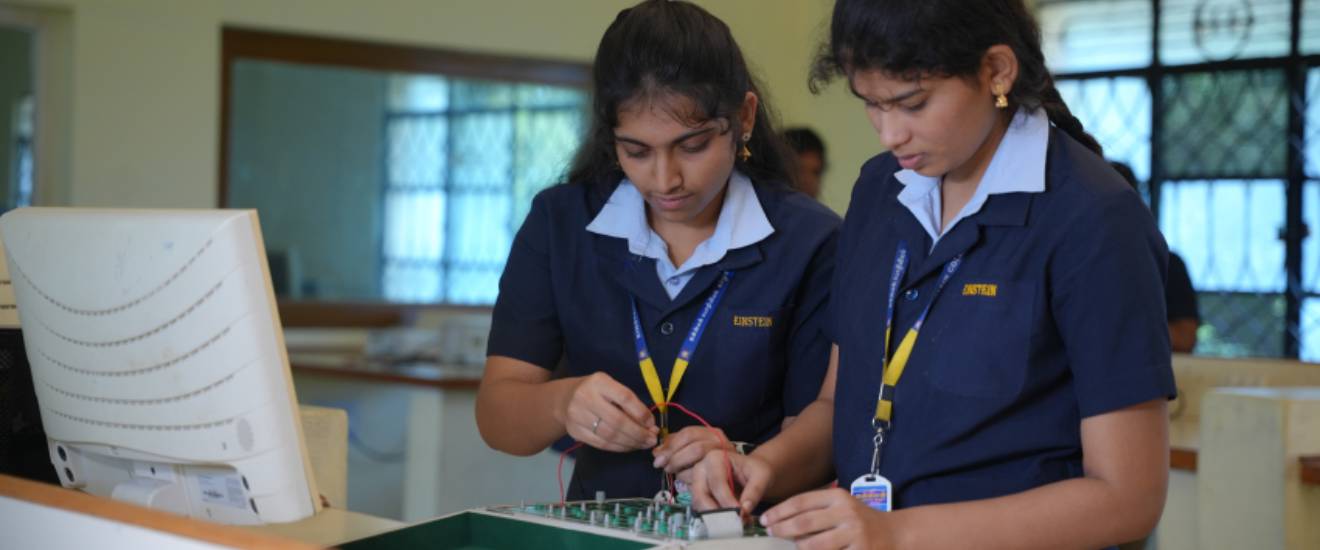
ABOUT THE DEPARTMENT
The Electronics and Communication Engineering department of our College has been established in the year 2004, offering both Under Graduate and Post Graduate programmes. The field of Electronics and Communication Engineering is one of the imperative branches of Engineering. This department has a team of dedicated, well-qualified and experienced teaching faculty members.
VISION
To serve humanity through academic excellence and research with values
MISSION
To strive constantly to set a benchmark in Electronic Devices and Systems by revamping the students through academic and research with ethical responsibilities, professionalism and life-long learning
Our department students associations, named as Einstein Legends Association for Communication Engineers [ELACE] was established in 2006. At the beginning of every academic year, we inaugurate these Associations to organise various programmes for the career development of our students, These Associations mainly focus on placement training and soft skill development training for our students. As part of this, we are organising hands on training program, national level symposium, paper presentation, quiz competition, technical aptitude tests, industrial visit and workshop for our students. In order to exhibit students’ innovative project ideas, every year, a competition called "Open house" expo has been organised.
TEACHING STAFF |
SL.NO. | FACULTY NAME | DESIGNATION |
1. | Mrs. G. Renganayagi | Assistant Professor |
2. | Dr. S. Komalavalli | Associate Professor |
3. | Dr. J. Alphas Jeba Singh | Associate Professor |
4. | Mr. S. Santhosh | Assistant Professor |
5. | Mrs. T. Viji | Assistant Professor |
6. | Mr. J. Prem Kumar | Assistant Professor |
7. | Mr. S. Arun Singh | Assistant Professor |
8. | Ms. D. Narmatha | Assistant Professor |
9. | Mr. M. Ashok Kumar | Assistant Professor |
NON-TEACHING STAFF |
SL.NO. | FACULTY NAME | DESIGNATION |
1. | Mrs. K. Rama Lakshmi | Lab Technician |
LAB FACILITIES
- DST Aided Research Lab
- Circuit and Devices Lab
- Electronic Circuits Lab I
- Electronic Circuits II and Simulation Lab
- Linear Integrated Circuit Lab
- Digital Signal Processing Lab
- Communication System Lab
- Microprocessors & Microcontrollers Lab
- Computer Networks Lab
- VLSI Design Lab
- Electronics System Design Lab
- Optical and Microwave Lab
Networks Laboratory
Network laboratory is equipped with licensed Netsim software which helps the students to have an exposure to open source software. This lab also holds LAN trainer kit which provides the students with knowledge to monitor network usage and bandwidth. This lab gives in depth view of how computer networks in real time, simulation of various topologies are performed using both LAN trainer kit and Netsim software.
Embedded system Laboratory
Embedded system lab helps the students to enhance their knowledge on architecture, programming and interfacing of various processors and microcontrollers. The hardware includes microcontrollers and ARM processors. It helps the students to do their projects on latest trends and technologies.
Digital Signal Processing Laboratory
Digital Signal Processing Laboratory has both software tools and DSP processors. The laboratory has MATLAB software with various tool boxes and Simulink. Students can learn, analyse and design techniques and develop their skills in the research activities in the area of DSP. This also equipped with licensed LABVIEW software to design the smart machines or the industrial equipment such as heating and cooling system, lighting system and so on. It is also used to develop production test systems, design wireless communications, verify Electronic designs and measure physical systems with sensors or actuators.
Communication Laboratory
Communication laboratory focuses on training the students for constructing the circuits for analog and digital modulations as well as to learn transmission/reception of analog and digital signals. The Laboratory is equipped with Digital storage oscilloscope, cathode ray oscilloscope, function generator, digital and analog modulation trainer kits.
Microprocessor and Microcontroller Laboratory
Microprocessor and Microcontroller laboratory helps the students to develop their knowledge on the processor architecture and the programming skills. It holds the hardware’s such as 8085 microprocessor trainer kits, 8086 microprocessor trainer kits, 8051 microcontroller training kits and interfacing cards. This laboratory provides hands on experience to interface I/O devices, perform A/D and D/A conversions, digital clock designs, Stepper motor controller, traffic light control system etc., It helps the students to develop their skills, enhance the knowledge and helps to do their projects.
Optical and microwave Laboratory
The optical laboratory is well equipped with trainer kits to analyze the numerical aperture and attenuation measurements and also to measure the analog and digital transmissions. The LED and Laser diode units in the optical laboratory are used to measure the source and detector characteristics. Microwave Laboratory is equipped with the klystron tubes, Gunn diodes, Klystron Power supplies, Modulators, directional couplers, various power energy and VSWR meters. It provides the necessary exposure to the students for analyzing the radiation pattern of an antenna.
VLSI Laboratory
The VLSI laboratory is equipped with the standard VLSI EDA tool and hardware resources like Xilinx software, licensed Cadence and Synopsys software, Spartan3 FPGA, Virtex5 FPGA kit. This laboratory is designed to expose the students for CMOS design, simulation, design rule checking, and physical layout of the circuit and verify schematics. It helps the students to develop their skills in the recent technology.
Electron Devices circuits Laboratory
Circuits and components of EDC Laboratory can be of two categories as analog and digital. This lab make the students to learn the operating principle and applications of analog circuits such as amplifiers, oscillators, Switching Circuits and Multivibrators. Students can also construct simple digital circuits such as logic Gates, adders, Flip flops, counters, registers and multiplexers, Sequential and combinational logic circuits. The basic electronic equipments such as multimeter, cathode ray oscilloscope, function generator, regulated power supplies, bread boards and IC trainer kits are most commonly available in our laboratory. Multisim software is used to design the circuits. Through this laboratory, student receives good training to handle any electronic equipment available in electronics field.







